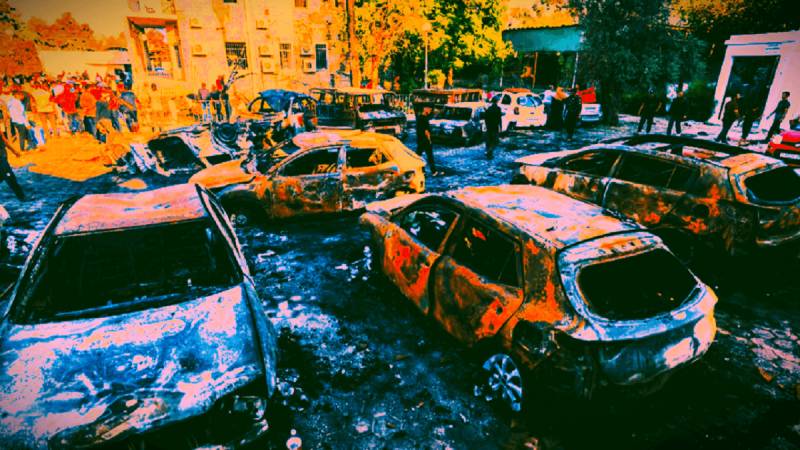
US President Joe Biden arrived in Israel on Wednesday as the first American head of state to visit the country "during a time of war". With a strike on the Al-Ahli hospital in Gaza taking place just hours prior, causing at least 300 deaths, mostly children, he opted to back his ally in the emerging war of narratives.
"I was deeply saddened and outraged by the explosion at the hospital in Gaza yesterday. And based on what I've seen, it appears as though it was done by the other team, not you," Biden said while meeting with a beaming Israeli Prime Minister Benjamin Netanyahu in Tel Aviv on Wednesday.
"But there's a lot of people out there not sure so we have to overcome a lot of things," Biden said, suggesting that the global refusal to accept Israel's version that the attack was a misfiring missile launched by Islamic Jihad.
Doctors at the Al-Ahli hospital, eye witnesses and videos of the strike pointed to the scale of destruction and the distinct "screech" of a bomb falling as empirical evidence that it was an Israeli air strike on the hospital. They also pointed to evacuation orders issued by the Israeli military from a week ago and messages posted on social media by Israeli government officials taking credit for the attack before deleting them when videos of the scale of the attack and devastation came out.
It even prompted the US, for the first time in the 12-day-long conflict that has left over 3,500 Palestinians dead - including the complete obliteration of 45 families, to put out a message calling for aid to flow into Gaza. US Secretary of State Antony Blinken announced that Israel had agreed to a US plan to provide aid to Gaza.
On Wednesday, Biden said he was "proud" to visit and stand by Israel. He urged Netanyahu to ensure the flow of "life-saving" capacity to cross into Gaza to help innocent Palestinians caught in the crossfire.
Aid blocked
Egypt, which shares a border with Gaza at the Rafah border crossing towards the south of israel, said that Israel was blocking provision of aid to Palestinians trapped in Gaza. He pointed to Tuesday's air strike on the border that targeted aid trucks, saying any aid operation was impossible in this situation.
Egyptian President Abdel Fattah al-Sisi warned that to allow another displacement of Palestinians from Gaza would trigger a similar displacement of Palestinians from the West Bank into neighbouring Jordan.
With Palestinians squeezed out of both Gaza and West Bank, he said it would make the dream of the Palestinian state an impossibility.
Sisi, who met with German Chancellor Olaf Scholz in Cairo, warned that unless there was an international intervention, the military escalation could spiral out of control.
Ceasefire
Meanwhile, Pope Francis and United Nations General Secretary both put out messages calling for a ceasefire and for addressing the humanitarian crisis in Gaza.
"The situation in Gaza is desperate," the Pope said in his official message on the social media site 'X' (formerly Twitter).
"Please let everything possible be done to avoid a humanitarian catastrophe. The possible widening of the conflict is disturbing. Let the weapons be silenced; let the cry for peace be heard from the poor, from the people, from the children!"
The situation in #Gaza is desperate. Please let everything possible be done to avoid a humanitarian catastrophe. The possible widening of the conflict is disturbing. Let the weapons be silenced; let the cry for peace be heard from the poor, from the people, from the children!
— Pope Francis (@Pontifex) October 18, 2023
Similarly, Guterres called for an "immediate humanitarian ceasefire in the Middle East" to ease what he termed an "epic human suffering".
I call for an immediate humanitarian ceasefire in the Middle East to ease the epic human suffering.
— António Guterres (@antonioguterres) October 18, 2023
Too many lives - and the fate of the entire region - hang in the balance.

